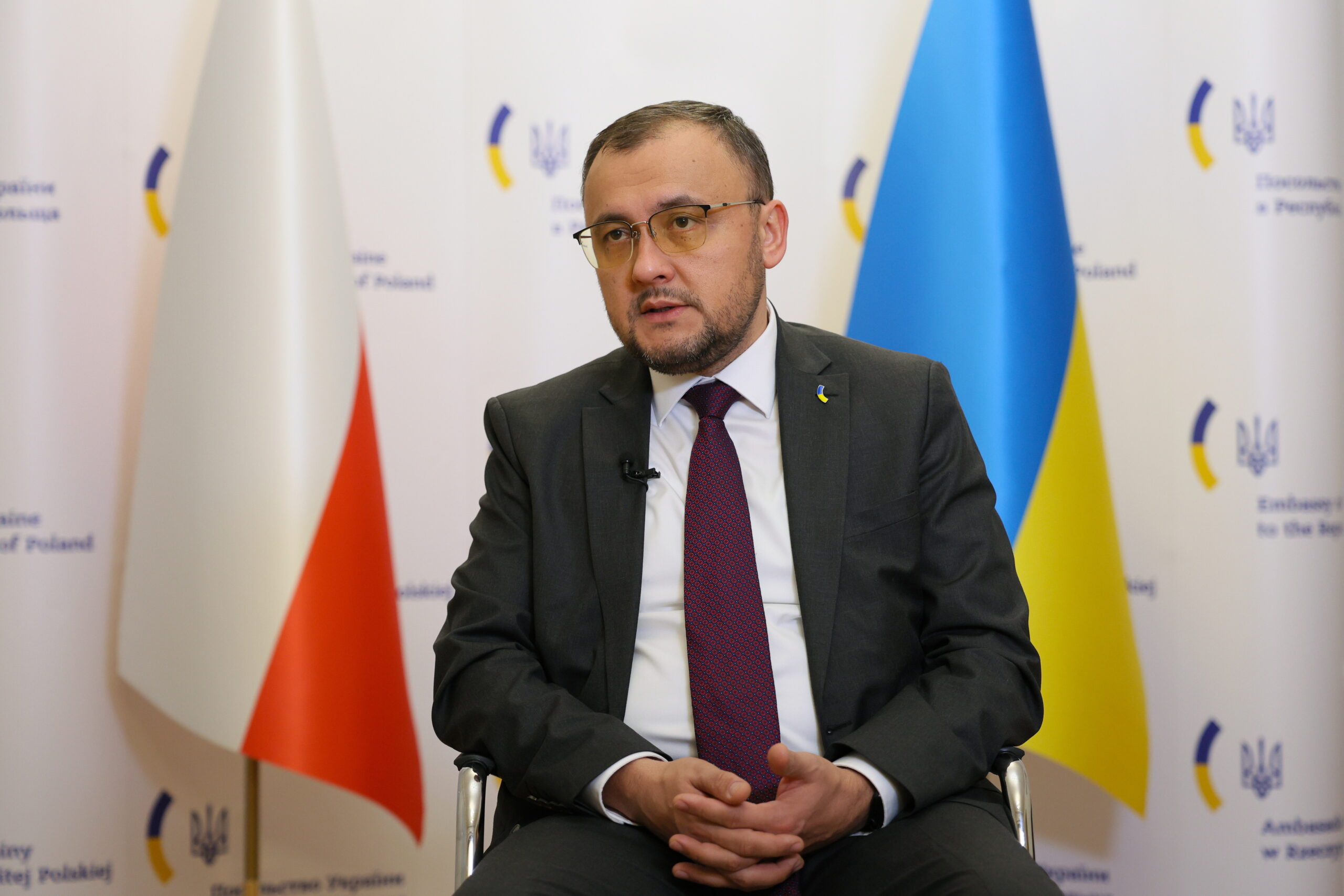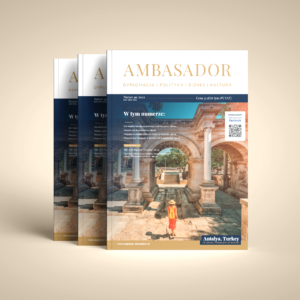The voice of our diplomacy is much more appreciated today than it was three years ago, says Vasyl Bodnar, Ukraine’s ambassador to Poland.
Until recently, you were Ukraine’s ambassador to Turkey, and since last November, you’ve held the same post in Poland. How is the work in these two diplomatic missions different?
The tasks are essentially the same, because the role of an ambassador is to develop bilateral relations, to implement Ukraine’s Euro-Atlantic aspirations, and to find ways to resolve problematic issues. So the job is similar in principle, but I have a lot more work to do in Warsaw. I don’t think it’s an exaggeration to say that I’ve had more meetings and visits in three months here in Poland than in three years in Turkey. This is, of course, linked to Poland’s geographical position as a “lifeline” for Ukraine in every sense of the word. We’re developing cooperation with Poland on many levels, and many of these issues require proper coordination, which of course takes a lot of time. At the same time, it’s worth noting that personal involvement in bilateral relations brings good results. But I feel very comfortable in Poland – in fact, I used to work at our embassy here, from 2006 to 2010. I have a warm affection for Poland because we have had a good life here. Two of my children were born there. My knowledge of the Polish language also helps me in my work.
I imagine that many of your responsibilities are a consequence of the fact that millions of Ukrainians live in Poland?
Sure, that’s true – and that’s another difference from the mission in Turkey. Every Ukrainian has their own story and their own reason for coming to Poland. Some came for economic reasons, others to escape the war. This means that everyone feels and adapts in a different way – some dream and plan to return to Ukraine, others want to settle in Poland. Ukrainians integrate quickly, learn Polish and the majority either study or work. They speak Polish at work or university, but read the news in Ukrainian or speak Ukrainian at home. We keep our culture even as we become part of Polish society. Obviously, different narratives appear in the media – for example, disinformation that contributes to the mistreatment of Ukrainians by portraying them as allegedly overusing Polish social services or health care. We advocate the use of credible information in communication and participate in efforts to combat disinformation.
Opinion polls show a decline in positive attitudes among Poles towards Ukrainians – from 64 to 55 per cent. Is it a challenge for an ambassador to improve this figure?
If more than half of Poles still speak positively about Ukrainians, that’s still a very good result. Changes in attitudes are a natural process. And if we look at attitudes over the last 30 years, they’ve clearly changed. There was a wave of great sympathy when we gained independence, then again during the Orange Revolution and the Revolution of Dignity. In between, this sympathy sometimes waned due to various factors, including historical grievances. When the war broke out three years ago and Poles took in millions of Ukrainian refugees, attitudes towards Ukrainians improved significantly. Today, people’s views may be shaped by personal experiences, some may fall for myths, and some politicians use the Ukraine issue for their own purposes. When we see a real problem, we try to act to resolve the situation. It’s also worth noting that since the joint working groups of historians from both countries began working together, there has been less public discussion of Polish-Ukrainian historical disputes. Today, institutional cooperation between our countries is much broader than it was a few years ago. Since around 2018, this cooperation has stalled for several years and has only recently begun to be rebuilt. And the more cooperation we have, the less mutual prejudices, myths and disinformation will shape public opinion.
How has Ukraine changed over the past three years – both as a state and as a nation?
When many predicted we’d only last three days, Ukraine has resisted full-scale Russian aggression for over three years. This is the main answer – and it comes from the front, from society, from the leaders. It shows that when there is a will – and there is one – the nation will defend its state, even at the highest cost: human life. At some point in history, every country faces the need to defend its freedom and fulfil its role. I hope this doesn’t sound too sentimental, but our current struggle against the Russian aggressor, in which we are sacrificing lives, is similar to the situation in 1920, when Poland defended itself against the Bolshevik invasion – and also protected the civilised West from Eastern aggression. Today we are facing the same fate – we are defending the West against Eastern aggression, because the aggressor’s ambitions remain the same: the Russian Empire wants to regain its former power and control, just as it has done for the last 300 years. In geopolitical terms, as Zbigniew Brzeziński pointed out in his famous book The Great Chessboard, Russia is not an empire without Ukraine, but Europe is stronger with Ukraine. And this is now obvious: by defending itself, Ukraine is also defending Europe, defending the values of the civilised world, democracy and the right to choose. The Ukrainian-Russian front line today is not just a line of military action. It is a border between civilisations, between the culture of the democratic West and the authoritarian East. Some may say ‘Ukraine is losing this war’, but we’re fighting the second largest army in the world, which has made very limited progress in three years – only about seventy kilometres a year. Our army is holding back the aggression, even though it is much smaller than Russia’s. Of course, military support from NATO countries plays a huge role, but we’ve also made many organisational improvements. Our authorities have mastered crisis management in many areas: effective logistics for weapons deliveries, air raid warning systems and emergency response after attacks. Society continues to actively support the army, including through voluntary donations. The state continues to function despite the ongoing war.
Compared to the situation before the full-scale invasion, what is the current position of Ukrainian diplomacy in the world?
Our country’s voice on the world stage – as expressed through our diplomacy under President Volodymyr Zelensky – carries much more weight, perhaps a hundred times more than it did three years ago. We are present wherever the world’s key issues are discussed, and Ukrainian diplomacy is highly respected there. Particularly in our relations with the European Union, it’s clear that a lot of support can be mobilised to defend Ukraine. Recent developments show that Europe will step up its efforts to support Ukraine militarily – and will also begin to rearm itself.
The main achievements of Ukrainian diplomacy under President Zelensky have been the consolidation of international support for Ukraine, numerous negotiations on military assistance to ensure that Ukraine’s armed forces have everything they need to defeat the enemy on the battlefield and protect civilians with air defence, and the strengthening of Ukraine’s international standing.
And what role do you see for Polish diplomacy in matters related to the war in Ukraine?
Poles have long been aware of the dangers Russia poses to the world. In fact, before the Russian aggression, Ukrainian society didn’t fully understand the threat posed by Russia – and now we are receiving something like an awareness vaccine from the Poles. Polish diplomacy has played and continues to play an important role not only in supporting Ukraine, but also in uniting international efforts on our behalf and in spreading the truth about Russia’s true face. Poland now has a unique opportunity during its Presidency of the European Union. We have seen Poland’s help from the very beginning of the war. While other Western countries were still considering whether to provide us with military assistance, Polish PT-91 tanks, Rosomak armoured personnel carriers and Krab howitzers were already fighting on the front lines. It was a practical example that other countries followed. Ukraine is immensely grateful to Poland for its help and for sheltering millions of Ukrainians after the outbreak of full-scale Russian aggression. We appreciate the efforts of Polish diplomats and citizens. All this has borne fruit and led to positive results.
We also appreciate the current efforts of Polish diplomacy. Foreign Minister Radosław Sikorski is a consistent and firm supporter of Ukraine. He recently took a strong position at the UN and is now speaking openly about the realities of the war – his voice is being heard and influencing the positions of other countries. We are grateful that when President Andrzej Duda travelled to meet the US President, he also discussed Ukraine with Donald Trump. This is, of course, highly appreciated in Ukraine as it helps to consolidate the international community and develop a common position.
Ukrainian politicians often talk about security guarantees for your country. What exactly does that mean?
At the moment, it means first and foremost the supply of military equipment, weapons and ammunition to the front line. For example, we need anti-aircraft missiles, drones and equipment to counter enemy drones, electronic warfare tools and artillery shells. Security guarantees for Ukraine are essential to ensure confidence in any ceasefire agreement. We don’t yet know what conditions we will agree with our European and American partners to restore peace. Once the guns fall silent and the diplomats start talking, only then will it be possible to determine what specific guarantees are needed. Obviously we’ll need our airspace patrolled by partner air forces. Ground forces will also be needed to keep the peace in Ukraine. We have to remember that before 2022, every time a ceasefire was reached, Russia violated it – more than 25 times since 2014. I believe we are at a point where we can talk about the possible deployment of troops in Ukraine. And we need to define the conditions under which this can happen. The deployment of troops is an open question and requires wise decisions. It’s crucial to restore a lasting and just peace – mere silence on the front lines is not enough. President Zelensky has outlined a plan for victory, according to which the best guarantee would be Ukraine’s accession to NATO, which would solve many problems.
What would NATO gain by admitting Ukraine?
NATO’s expansion into Ukraine would create new opportunities for the Alliance itself, as it would have access to a million-strong Ukrainian army – trained and battle-hardened. A soldier who’s smelled gunpowder is worth more than several who’ve never been to war. Obviously, the accession process will take some time. But let’s look back – was Poland ready for NATO membership in the early 1990s? Certainly not. But by the end of the decade it was.
We don’t know yet how the war will end, but if it does end somehow, what do you think Polish-Ukrainian relations will look like?
After the war, there will be great opportunities to expand cooperation in many areas, especially in the economy. We will need Polish companies to help rebuild our cities, villages and infrastructure. There will be opportunities for joint business ventures. We will also need to cooperate in the defence industry – in the production of weapons and related equipment – because we need to be strong. For now, despite the war, trade relations are good, although Polish companies are not in a hurry to invest in Ukraine. I encourage them to at least set up their representative offices for the time being. Many towns far from the front line are already in need of repairs to various facilities. Local authorities are already open to talks with potential partners for such work.
And what about ordinary people and travel between our countries?
Many refugees will want to return to Ukraine – that’s’ for sure. But nothing will be forced – it will only happen if the right conditions are created in Ukraine, especially in terms of everyday security. I think some of my compatriots will want to travel to Poland and other EU countries. We have visa-free travel with the EU, but perhaps additional solutions will have to be developed. Many Ukrainians will probably stay in Poland. In their own way, each of them is already a kind of ambassador for our country. The vast majority of them work honestly, and Poland benefits greatly from them. We must make the most of this and strengthen our alliance for the future. Overall, I believe that the current situation has brought Poles and Ukrainians much closer together. We know each other better than before, and I hope that this will continue to bring more and more positive results.
Thank you for the conversation
Paweł Rochowicz



Sledź nas na: